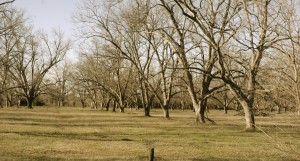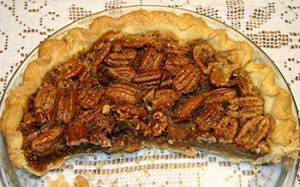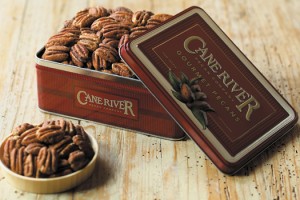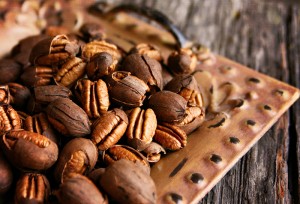 I have memories of being cold – really cold – on Cane River. A large portion of our orchards in Natchitoches Parish, La., was located on a beautiful stretch of this scenic river, which is actually a lake due to dams built in the early 20th century. It meanders through a part of Louisiana that is graced with historic plantation homes, huge stately oaks, occasional cotton fields and beautiful pecan orchards. Even though we are located here in the Deep South, many in the area consider the Cane River country North Louisiana. (We tend to think of anything above Interstate 10 in Louisiana as North!) Only about 120 miles separate Cane River Country from South Louisiana, but in those few miles the land begins to take a new shape. The dirt turns from black to red, crops go from sugar cane to beans, cotton and pecans, and the temperatures are relatively cooler. It’s almost as if you’ve entered another state.
I have memories of being cold – really cold – on Cane River. A large portion of our orchards in Natchitoches Parish, La., was located on a beautiful stretch of this scenic river, which is actually a lake due to dams built in the early 20th century. It meanders through a part of Louisiana that is graced with historic plantation homes, huge stately oaks, occasional cotton fields and beautiful pecan orchards. Even though we are located here in the Deep South, many in the area consider the Cane River country North Louisiana. (We tend to think of anything above Interstate 10 in Louisiana as North!) Only about 120 miles separate Cane River Country from South Louisiana, but in those few miles the land begins to take a new shape. The dirt turns from black to red, crops go from sugar cane to beans, cotton and pecans, and the temperatures are relatively cooler. It’s almost as if you’ve entered another state.
It is these “cooler” temperatures that I remember most about the harvests on Cane River. My father would rise early with my two brothers and me in tow and throw open the barn doors on another day of pecan gathering. The barn was piled high with burlap sacks of pecans and was extremely cold until the mid-day sun could warm us all. The early morning was spent getting tractors gassed up, pickers to their assigned areas of the orchard, and setting up the picking tables and pecan sorter. It was constant motion that continued until the last pecan was picked for the season in late December.
However, life on a pecan farm in the early winter was not all work and no play. Many mornings we found time for a family duck hunt in old Ben Lake, a rather small 4-acre pond that inevitably found itself filled with hearty green heads on many mornings. Then there were cool morning squirrel hunts – which my father demanded was nothing more than an orchard varmint that just so happened to taste great over rice. We had a huge hay barn on the plantation that served as a virtual playground for active boys, and shooting BB guns was a rite of passage for all of us.
The end of the day was always met with a fire. Because we lived in New Iberia and our farm was located just outside of Natchitoches, my father rented a home that was conveniently located just beside his beloved pecan trees. The house was very modest; however, I remember a great old jukebox left there by the owner and a perfect little fireplace that was a cozy way to spend an evening after a long day in the field. When I think of Cane River in the winter I think of being cold. And when I think of being cold I think of being with my father at the end of the day in front of that fire. And that thought stills warms me today.




 My family has been in the pecan industry for the past 45 years and never have we seen the escalating pecan prices that we have seen during the last few. Pecan prices are at an historic high. There have many national stories from Forbes to The Wall Street Journal that have covered the bewildering high pecan prices and how this will affect the common consumer. I feel compelled to weigh in and give my perspective since it is my livelihood.
My family has been in the pecan industry for the past 45 years and never have we seen the escalating pecan prices that we have seen during the last few. Pecan prices are at an historic high. There have many national stories from Forbes to The Wall Street Journal that have covered the bewildering high pecan prices and how this will affect the common consumer. I feel compelled to weigh in and give my perspective since it is my livelihood.  I have memories of being cold – really cold – on Cane River. A large portion of our orchards in Natchitoches Parish, La., was located on a beautiful stretch of this scenic river, which is actually a lake due to dams built in the early 20th century. It meanders through a part of Louisiana that is graced with historic plantation homes, huge stately oaks, occasional cotton fields and beautiful pecan orchards. Even though we are located here in the Deep South, many in the area consider the Cane River country North Louisiana. (We tend to think of anything above Interstate 10 in Louisiana as North!) Only about 120 miles separate Cane River Country from South Louisiana, but in those few miles the land begins to take a new shape. The dirt turns from black to red, crops go from sugar cane to beans, cotton and pecans, and the temperatures are relatively cooler. It’s almost as if you’ve entered another state.
I have memories of being cold – really cold – on Cane River. A large portion of our orchards in Natchitoches Parish, La., was located on a beautiful stretch of this scenic river, which is actually a lake due to dams built in the early 20th century. It meanders through a part of Louisiana that is graced with historic plantation homes, huge stately oaks, occasional cotton fields and beautiful pecan orchards. Even though we are located here in the Deep South, many in the area consider the Cane River country North Louisiana. (We tend to think of anything above Interstate 10 in Louisiana as North!) Only about 120 miles separate Cane River Country from South Louisiana, but in those few miles the land begins to take a new shape. The dirt turns from black to red, crops go from sugar cane to beans, cotton and pecans, and the temperatures are relatively cooler. It’s almost as if you’ve entered another state.